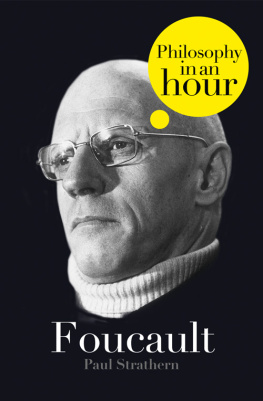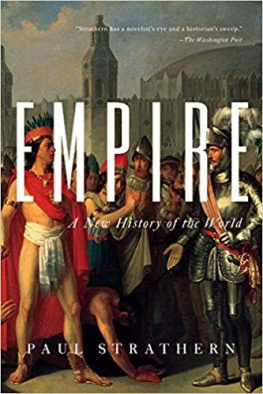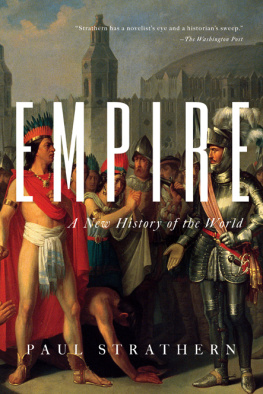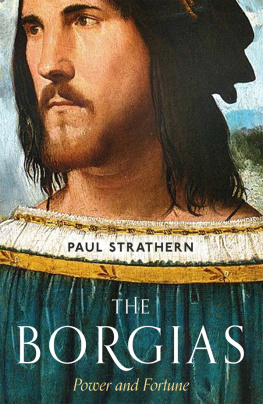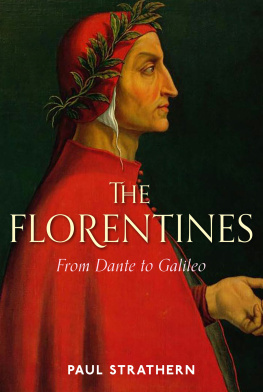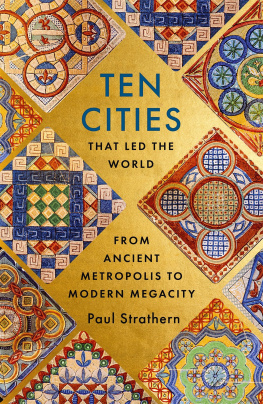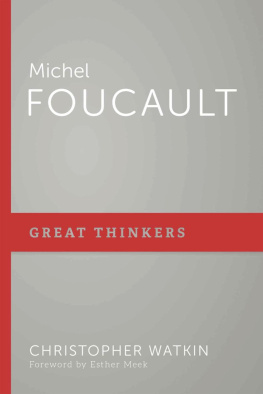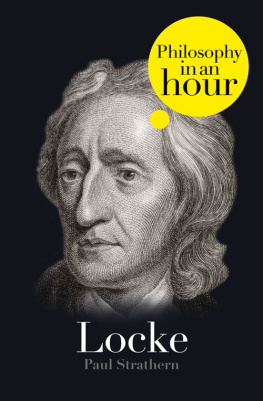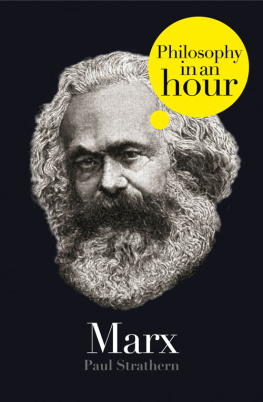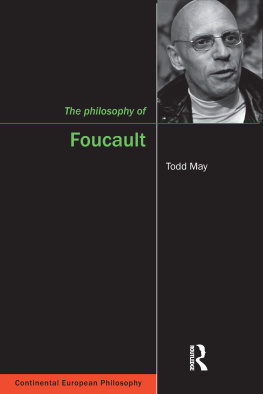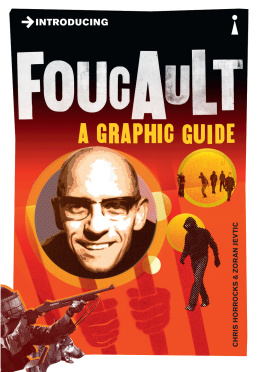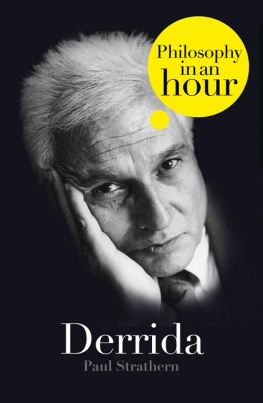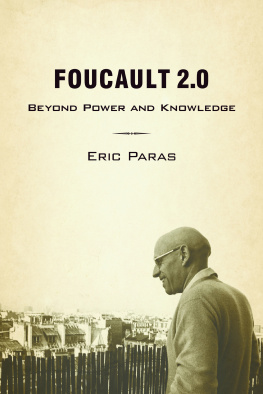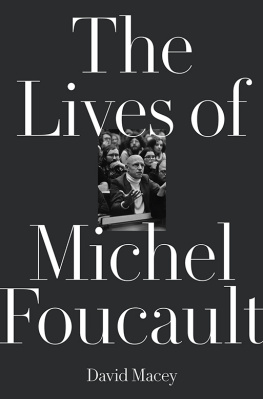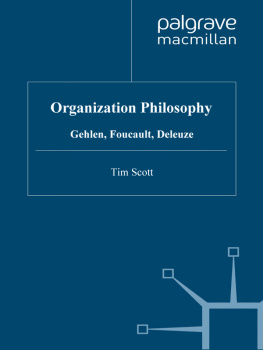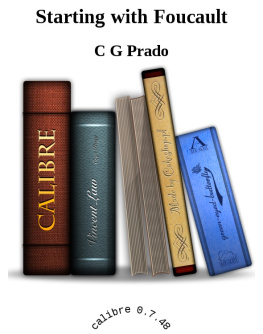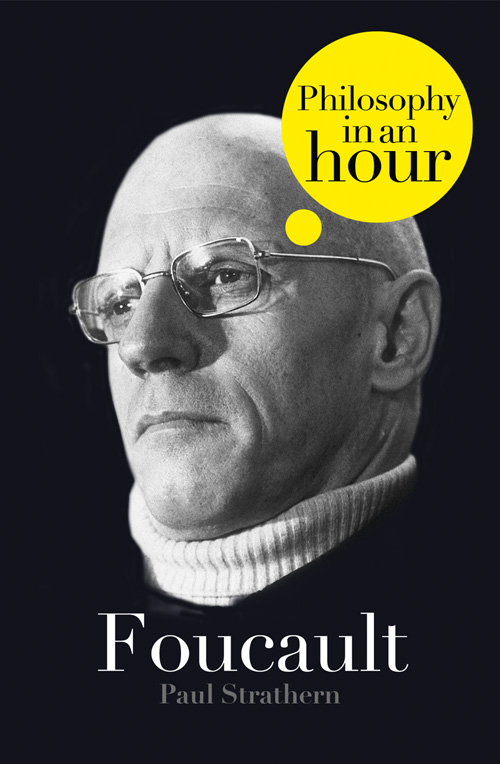Foucault
PHILOSOPHY IN AN HOUR
Paul Strathern

Contents
Foucault was not a philosopher in the classical tradition. Even so, at one stage in his life he was regarded in some quarters as the new Kant an absurdly overblown estimation. But this was hardly Foucaults fault (even if he did little to discourage such opinions). It was also hardly his fault that the very possibility of being a classical philosopher was completely beyond him. This is no mere intellectual judgment. The fact is, Wittgenstein had to all intents and purposes brought philosophy in the classical tradition to a close. Wittgenstein had insisted there was no longer any such thing as philosophy just philosophising. Most major philosophical questions were the result of linguistic errors. Untangle the mistake, and the question simply disappeared. And any remaining questions were simply unanswerable (or, more correctly, unaskable).
But a variant of the classical philosophical tradition did persist in continental Europe, in the work of Heidegger. This claimed to operate beyond Wittgensteinian realms, beyond the reach of logic, analysing the very grounds of our thought and apprehension. Foucault was heavily influenced by this tradition. It led him to uncover how philosophy, and indeed all knowledges, arrive at their versions of the truth. He showed that such truths depended largely upon the assumptions, or mind-set, of the age in which they were promulgated.
Foucault set about his task like a historian rather than a philosopher. Painstakingly he researched original documents from the period he was investigating. These revealed firsthand the society, knowledge, and power structure of the age in question. Foucault concluded that knowledge and power were so closely related that he collated them in his term power/knowledge. This was the central issue of his philosophy. But in reaching it, and investigating its implications, he covered a wide range of often sensational material. Madness, sexuality, discipline and punishment the history of such topics was considered essential to his argument. Add to this the relation of these topics to his personal life, and you have the most sensational philosopher of modern times.
Yet how much of actual philosophical worth was contained within all this sensationalism? Nearly twenty years after his death, reactions to this question remain sharply divided. Philosophical oblivion is easily attained: the fact that Foucault is still being discussed at all is recognition of a sort. How much longer this state of affairs will continue is up to us to decide.
Paul-Michel Foucault was born on October 15, 1926, at Poitiers, 250 miles south of Paris. His family were well-to-do bourgeois in a town that has remained a byword for French provincialism. His father was a surgeon, taught at the local medical school, and ran a prosperous practice. His mother was a strong-minded woman who managed her husbands finances, helped administer his practice, and daringly drove an automobile.
Besides their town house in Poitiers, the family owned a small manor house in the country. During Paul-Michels childhood they also built a seaside villa on the Atlantic coast at La Baule. This was large enough for a family of five and servants. Here the family spent their summer holidays amidst the pine trees overlooking a long curve of sandy beach. Father was kindly but stern, mother was efficient but concerned. For Paul-Michel, life at home with his older sister and younger brother was the epitome of normality. Such was the standard background of so many intransigent French intellectuals who have revolted against all forms of authority and bourgeois behaviour. (Although he would strive to rebel against so much else, Foucault would not be able to avoid conforming to this Gallic stereotype, which had held sway from Voltaire to Sartre).
At school young Paul-Michel was weedy and shortsighted. As a result his schoolmates soon corrupted his name to Polchinelle (the French equivalent of the hunchbacked figure of fun we know as Punch). Freudians will be intrigued to know that he dreamed of becoming a goldfish. Such fishy ambitions were reflected in his academic performance. Although evidently bright, he never excelled. Even at his favourite subject, history, he only finished second.
World events impinged little on sleepy Poitiers or Foucault family life. The seaside villa was built during the early years of the depression; Hitlers posturings on the newsreels were dismissed with sophisticated ridicule in the press; and the blandly debonair records of Maurice Chevalier spun on the phonograph.
When he was ten, young Paul-Michel saw the first refugees from the Spanish Civil War tramping through the streets of Poitiers. Three years later Germany invaded Poland, launching World War II, and the family drove back from their summer holiday at La Baule for the last time. By the time Foucault was fourteen, the Nazis had invaded France, the French army was retreating in disarray, and even Poitiers was in turmoil. With the unbending ineptitude of an operating-theatre martinet, Dr. Foucault supervised the setting up of emergency medical units in the town. In the background his wife painstakingly smoothed ruffled feathers and efficiently ensured that things got done. Now wearing glasses, but still in short pants, young Paul-Michel looked on in bewilderment. That summer his exam results plummeted.
Mother pulled strings to have him transferred to another school, whereupon the academic ugly duckling turned into a swan. This was to become something of a pattern. Foucault was to under-perform at important exams but then shine when he took them a second time. At the age of twenty, on his second attempt, Foucault gained a place at the cole Normale Suprieure in Paris. This was the intellectual hothouse where the crme de la crme of Frances students were put through their paces. To be a normalien marked one as a superior species for life. Normality has always been exceptional in France, and the superintellectual normaliens were often a fairly odd lot. But even here Foucault soon stood out.
By now the Punch of the school playground had developed into a decidedly prickly character. During the previous year or so he had gradually become aware that he was homosexual. Such a thing was not only illegal at the time; in Poitiers it was unthinkable. Paul-Michel couldnt even turn to his beloved mother for guidance and reassurance. And by this stage he had also fallen out heavily with Papa. The adolescent Paul-Michel refused to follow in the family tradition and become a doctor. He just wasnt interested in medicine, and that was that. He would stamp upstairs to his room, slam the door, and bury his head in yet another volume of history. By the time he took the entrance exam to the cole Normale Suprieure for the second time, there was no doubting that here was an intellectual thoroughbred. (He finished fourth in the entire country). But there was also no doubting that he had the unpredictable temperament of a thoroughbred.
In Paris he took to calling himself plain Michel (dropping Paul, his fathers name). Michel Foucaults first years at the ENS were to be a litany of incidents. On one occasion he slashed his chest with a razor; on another he had to be restrained while chasing a student with a dagger; and on another he nearly succeeded in committing suicide by taking an overdose of pills. He drank heavily and occasionally experimented with drugs (very much a minority pursuit in those far-off days). Sometimes he would disappear for nights on end, afterwards slumping back hollow-eyed and haggard into his dormitory with depression. Few guessed the truth. He was tortured with guilt over what had occurred on his lonely sexual expeditions.

